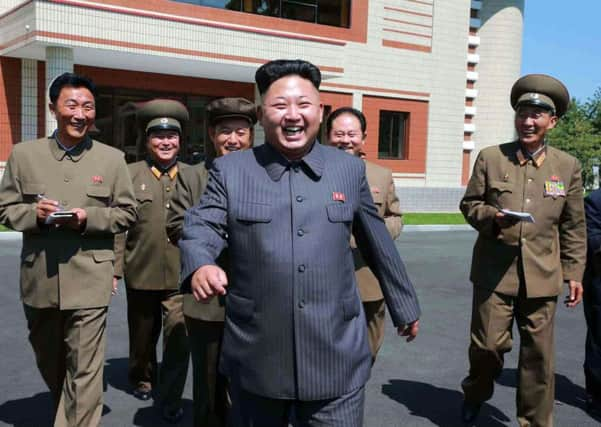Leaders: China holds the answer to North Korea question


Let’s leave aside the thorny moral issue of why it is perfectly acceptable for some countries to have nuclear weapons, particularly if they are Western democracies, and not for others, because that can be hard to explain to smaller countries with alternative governance structures.
But it is without doubt a matter of grave concern on a number of levels that North Korea is speeding up its nuclear testing.
Advertisement
Hide AdAdvertisement
Hide AdThe first is what it tells us about the current leader, Kim Jong-un. In 2012 he was appointed essentially commander-in-chief of Korea’s forces and he is known both to have an interest in the military and to believe that a strong military will end the oppression of his country my imperialist states.
He inherited power in 2011 and the country has carried out nuclear tests in 2006, 2009, 2013 and now two in 2016. The tension is being ramped up.
And there is a great deal of tension in that particular area already. Just last week the disputed areas around the South China Seas came up at the ASEAN summit of Asian leaders in Laos and China warned US president Barack Obama against sticking his nose in after the ruling by an international tribunal ruling that China’s sweeping claims to the South China Sea had no legal basis. China refuses to accept the verdict, Vietnam, the Philippines, Malaysia, Brunei and Taiwan also have territirial claims. Adding to that tension is not helpful.
And one of the greatest fears is not what North Korea itself might do with a nuclear capability, but that it might somehow be the means for a terrorist organisation such Islamic State to acquire a nuclear capability, either a working bomb or just enough radioactive material to make and detonate a so-called “dirty” bomb which would throw dangerous radioactive material in to the atmosphere.
No-one knows just what North Korea’s nuclear capability is, as it is known to have a limited amount of plutonium with which to build bombs, but the US now believes it has the capability of enriching uranium, which is much easier to hide from prying Western eyes, and it has plentiful supplies of uranium ore.
So what is to be done? The isolated communist nation has been hit by five sets of UN sanctions since its first test in 2006. It is evident that they have had no effect on the government’s ambitions. Further sanctions such as denying the country fuel would have a dramatic effect on the economy and the lives of its people. And China is wary, rightly, of further destabilizing the ruling regime. Western-instigated regime change has not exactly gone to plan.
Negotiations with North Korea have proved frustrating and fruitless, with any deals quickly reneged upon by North Korea, but the fact remains they present the only practical solution, and the key to success lies with China.
Borders line can make up lost time
Perhaps late trains and general slowness on the Borders railway should not surprise us. On Saturday 4 January 1969 British Rail ran a special train called Farewell to the Waverley Route on the line to mark its impending closure. It arrived late at Hawick. It seems that cultural heritage has continued.
Advertisement
Hide AdAdvertisement
Hide AdEven the recreation of the railway route moved at the speed of the wheeziest most clapped-out diesel, with the first feasibility study in to the line’s re-opening being commissioned in 1999, and it took 16 years for the first train to run. There was a great deal of debate about the business case for the new railway line, but there was definite political will.
But now its first anniversary of operation has been reached, and is the £350 million venture a success? Well, yes and no.
The first-year passenger journey total for the Edinburgh-Tweedbank route is expected to top 1.4 million - around 20 per cent above target. But the performance has been deemed unacceptable with train punctuality hitting a new low in August with only about one in four trains arriving on time.
There have also been complaints about delays and cancellations, Class 158 diesel trains used on the route which are ScotRail’s worst performers, and overcrowding on the two-carriage trains.
But taken togther, that must bring great hope for the future of the line. If a service which is so lacking can exceed passenger number expectations, just think what a decent journey could do. Let’s hope the ScotRail Alliance can shrug off its historical heritage and quickly get to the point of delivering a speedy and punctual service.